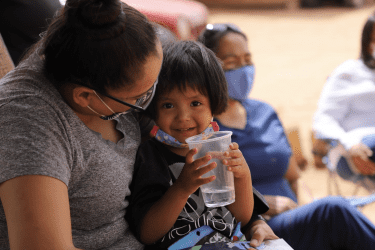About
Findings from the first phase of the Family Spirit Nurture (FSN) study in Shiprock, NM showed that 59.7% of Navajo mothers and children enrolled in the program experienced water insecurity at some point in their child’s first year of life. While 62% of mothers reported having piped water in their home, 82% reported bottled water as their primary source of drinking water. Further research is needed to understand the current circumstances of water access in Navajo communities, as well as how water security impacts water intake and sugar sweetened beverage (SSB) intake among families with young children.
In Spring 2019, the Johns Hopkins Center for Indigenous Health (JHCIH) launched a new study to explore water access on the Navajo Nation using a mixed methods approach. This research is informed by two local Tribal Advisory Boards composed of community members, health care providers, and water sector professionals.
JHCIH will include data already being collected from participants in the second phase of the FSN study. Self-report data will assess water availability, water security status, and other explanatory domains such as taste, smell, seasonal availability and prioritization of water use (i.e., cooking, washing/bathing, cleaning, drinking) when quantity is insufficient.
Longitude and latitude data will be gathered for FSN households. Water secure and insecure households will be marked on the same map and distances between households that are water insecure and safe water sources will be calculated to examine how distance to clean water sources impacts early childhood beverage feeding and weight status.
In addition, a subsample of FSN participants from Shiprock and Fort Defiance/Gallup study sites will be asked to participate in focus groups, in-depth interviews, and/or household water quality testing. Participants will have the opportunity to share how water access affects early childhood SSB consumption. Study staff will ask participants about coping strategies and challenges they face when accessing clean, safe drinking water.
This project will also include focus group discussions and in-depth interviews with key water sector stakeholders (i.e., local community experts, water sector professionals, and tribal officials) who work or have worked on water access issues and solutions on the Navajo Nation. This project aims to identify feasible water access solutions at the household, community, and tribal levels that could improve water intake, reduce sugar-sweetened beverage consumption, and promote healthy weight status.
To compare actual vs. perceived household water safety, we will test a random, voluntary subsample of the household water at 100 FSN participants’ homes. Data will validate what proportion of homes with running water have safe water.
This study is urgent and prudent in rural Native American settings. Findings will inform policies, systems, and environmental strategies to reduce SSB consumption, improve water access/ intake, and decrease Native American early childhood obesity. Further, findings will have potential for scale-up to other similarly affected populations through JHCAIHs national early childhood intervention network.
Sites: Shiprock, NM; Fort Defiance/Gallup, AZ

